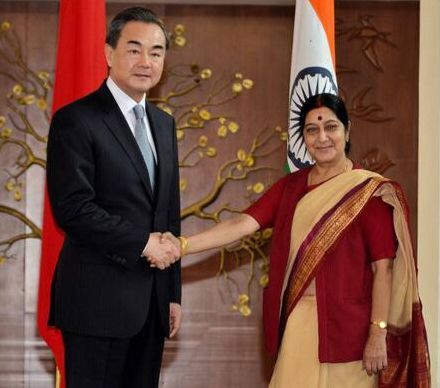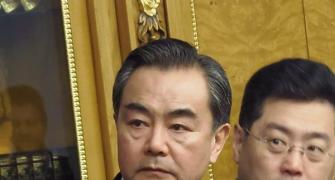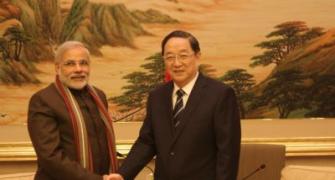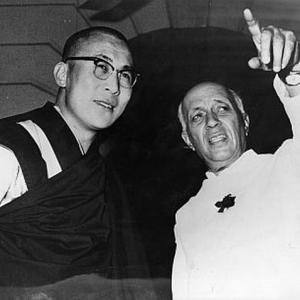 As the context of Panchsheel has changed, it is all the more essential that India and China need to reinvent and redefine Panchsheel for a new world order taking into account globalisation, and mutual economic interdependence. The new Panchsheel, in order to be relevant, needs to shed its binary approach of west verses the east recognising the seamlessness of global frontiers, which globalisation has brought in, says Rup Narayan Das.
As the context of Panchsheel has changed, it is all the more essential that India and China need to reinvent and redefine Panchsheel for a new world order taking into account globalisation, and mutual economic interdependence. The new Panchsheel, in order to be relevant, needs to shed its binary approach of west verses the east recognising the seamlessness of global frontiers, which globalisation has brought in, says Rup Narayan Das.
Though thereis a cryptic silence in the media, this year happens to be the 60th anniversary of the historic Panchsheel agreement. The Panchsheel agreement, or the five principles of peaceful coexistence, was the culmination of Sino-Indian relations in mid-1950s in the context of resurgent Asian nationalism, which begun with the onset of the process of decolonisation.
India’s proactive involvement in two major world events, viz, the Korean crisis of 1950s and the Indo-China imbroglio during the same time forged understanding and cooperation between India and China. Close on the heels of these two developments, on April 29, 1954, an Agreement on Trade and Intercourse between Tibet and India was signed between India and China. In the preamble to the agreement, both sides reaffirmed that they would abide by the five principles -- mutual respect for each other’s territorial integrity and sovereignty, mutual non-aggression, mutual non-interference in each other’s internal affairs, equality and mutual benefit and peaceful co-existence.
Then defence minister Krishna Menon made a special trip to Geneva to invite Chinese Premier Zhou Enlai to India. In New Delhi, Zhou Enlai was given a rousing reception on June 25, 1954, and on June 28 a joint statement was issued by the prime ministers of India and China. After reaffirming the five principles, they declared: “If these principles are applied, not only between various countries, but also in international relations generally, they would form a solid foundation for peace and security and the fears and apprehensions that exist today would give place to a feeling of confidence.” Zhou En-lai visited Rangoon on June 28, 1954 to meet Burmese leader U Nu and signed the communique on the five principles of peaceful coexistence similar to the one signed in New Delhi. It was against this background of growing understanding between the two countries that Jawaharlal Nehru’s own visit to China took place in October 1954. The spirit of Sino-Indian bonhomie, however, ran out of steam soon when border dispute between the two countries erupted, leading to the war in 1962.
The relationship between the two countries, however, has not been held hostage to the past baggage. The two countries have traversed a long distance ever since the border war of 1962. As in the fifties, when as newly independent countries, both India and China were reckoned as important global forces, similarly today, the two countries have emerged as major players in the world in terms of their economic prowess.
Only a few years back when the world was suffering from a severe financial crisis in 1998, both India and China played a critical role in mitigating the financial crisis. At the bilateral level the peace and tranquility in the border, notwithstanding occasional hiccups, is suggestive of the successful working of the CBMs between the two countries.
As the context of Panchsheel has changed, it is all the more essential that the two countries need to reinvent and redefine Panchsheel for a new world order taking into account globalisation, and mutual economic interdependence. Ideas and concepts like technologies need constant honing, innovation and value addition. The new Panchsheel, in order to be relevant, needs to shed its binary approach of west verses the east recognising the seamlessness of global frontiers, which globalisation has brought in.
Both India and China are now important and responsible stakeholders in the global governance. With Narendra Modi at the helm of affairs and one who believes in deliverable actions than pious platitudes and equally under the strong leadership of President Xi Jinping in China, it is hoped that the relationship between the two countries moves beyond the hackneyed rhetoric such as ‘there is enough space in the world for India and China cooperate and coexist.’
One cardinal principle of Panchsheel has been equality and mutual benefit, which is opposed to one-upmanship. As China is now a bigger power, it is all the more appropriate that it displays sensitivity and reciprocity in multilateral institutions like the United Nations Security Council and the BRICS. The reform of the United Nations’ Security Council is long overdue. India’s non-inclusion in the UNSC is anachronistic. China should demonstrate concerns to India’s aspiration to its rightful place in the comity of nations such as the Security Council, and BRICS etc. It is high time that China goes beyond its stated position that it understands and appreciates India’s aspiration to play greater role in the world, and comes out with clear proposal for UNSC reforms to accommodate India’s rightful place at the high table including all those who also deserves a seat there.
India is not only a founder member of BRICS, but its former Prime Minister Manmohan Singh played a critical role in the conceptualisation of the BRICS Development Bank. Beijing should ensure that India finds its rightful place in the governance structure and decision making process, and location of the BRICS Bank. Strategic partnership without genuine intents and contents are mere rhetoric, and will be unsustainable.
Similarly the two countries should work together in concert on issues such as climate change and fighting the menace of terrorism. The new world equilibrium needs to emerge, recognising the global shift of power. The transition may be tenuous, but not turbulent.
India and China before they play out their benign role in the global governance must settle their bilateral irritants first. There are domestic concerns also such as the strategic nexus between China and Pakistan particularly in the infrastructural development projects in Pakistan Occupied Kashmir, the issue of stapled visa to Indian citizens from Arunachal Pradesh and also the growing adverse trade imbalance against India. There should not be a ‘zero sum game’ between the two, and words should be matched with actions.
Image: External Affairs Minister Sushma Swaraj with her Chinese counterpart Wang Yi. Image courtesy: MEA
Rup Narayan Das is a senior fellow at the Institute for Defence Studies and Analyses










